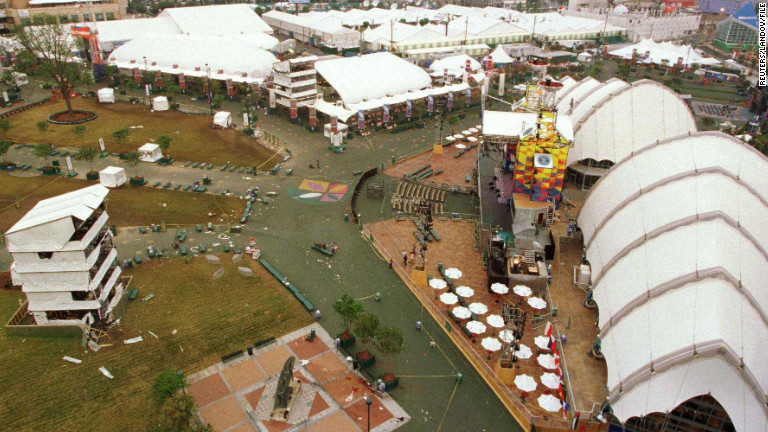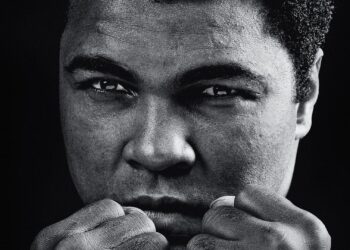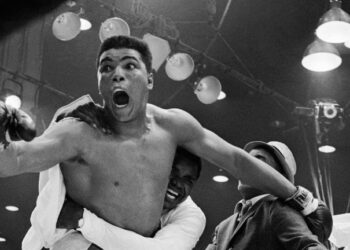By: Zachary Draves
Legendary USA Today Sports Columnist Christine Brennan has been telling it like it is for years.
She has covered a wide range of sports for almost forty years including college football, golf, NFL, figure skating, swimming, and every Olympics since 1984.
She’s also a commentator for ABC News, PBS NewsHour, and NPR, and the best-selling author of seven books.
Christine has paved the way for women in sports media and has been a tireless advocate for gender equality in sports across the board and is not the least bit shy in calling out sporting institutions such as the NFL and the Augusta National Golf Club on issues relating to gender-based violence and gender discrimination.
25 years ago she was in Atlanta to cover track and field and swimming on behalf of the Washington Post.
She bared witness to some of the most memorable moments of the games including Muhammad Ali lighting the torch during the opening ceremony, Michael Johnson’s record-setting 200 and 400 meters wins, and the dominance of the US Women’s Swimming Team to name a few.
While covering the Olympic swimming trials in Omaha, Nebraska back in June, I had the honor to speak with Christine to reflect on her time in Atlanta.
What was your experience like in Atlanta in 1996?
It is hard to believe that it was 25 years ago, it feels like it was 5 or 10. I was still at the Washington Post and it was the last Olympics I covered for the Washington Post. There was a lot of anticipation going into it and I covered several trials. I think the nation was excited to be hosting a Summer Olympics again. Obviously, it had been 12 years since L.A., not that long actually but it seemed like a long time. I had been to Atlanta a couple of times to watch the development of the sites and how it was coming along and write about it. There was a lot of interest.
So I got to Atlanta and immediately started focusing on International Olympic Committee meetings and covering swimming and track and field. The games were going along well, there were some complaints about bus drivers getting lost and there were some complaints about the transportation system and it got worked out but it got negative publicity starting out. Swimming was a great meet. Janet Evans was still swimming, Amy Van Dyken, and you had lots of great performances and the US team, especially the women, were excellent.
Then on the night swimming ended, Friday night, I was in my hotel which was right by the (Centennial Olympic) park. It was a Comfort Inn and it was the media hotel that was right by the park and by the press center. I was just in my room gathering my notes, putting swimming away, and getting track and field files out to pivot to track and field the next morning. The band was playing in the park and I heard this noise, an explosion, it really sounded like an explosion. I opened my draperies and I looked out and I was like “Ok that was strange”. I could see some smoke rising and one of the band members said, again I was close enough to hear what they were saying, even though I was in my hotel. He said “that’s not funny”. Then I closed the drapes and then about a minute later I was like “that didn’t sound right” so I opened the drapes and I saw a line of emergency vehicles coming in. It was the Atlanta bombing. I turned on CNN and what I saw out my window was what I saw on CNN. That of course was tragic, a woman named Alice Hawthorne died, and as we found out it was Eric Rudolph who set off the bomb. He bombed abortion clinics and other things too. I believe it was a Turkish cameraman who died from a heart attack covering the story. That really cast a shadow over the Olympics. The next day was a rainy day and I got about 1 to 2 hours of sleep. I worked all night, I looked out the window, and I called my editor right after the bombing happened. He was in his room down the hall and said “what do you want me to do?” He said “we’ve already got people in the park, just look out the window and call back to an editor at the Washington Post and tell them what you see”. So I did that. The executive editor at the Washington Post literally yelled “stop the presses!” so we were all feeding stories back to Washington about the bombing.

(Courtesy: CNN)
The next day was a grey day, rainy, certainly fit the mood of the Olympics. They carried on and there were amazing stories the second week but it seemed different it was definitely not the same. The Women’s Soccer Team of course won which led to the 99 Women’s World Cup. You had the Women’s Softball Team winning the gold medal and you had the Women’s Basketball winning and of course leading not only to one but two professional leagues in Women’s Basketball so it was really the Women’s Olympics.

(Courtesy: San Francisco Chronicle)

(Courtesy: Denver Post)

(Courtesy: Youtube)

(Courtesy: NBC Sports)
The games were run by Billy Payne, who I knew very well, who became the chairman of Augusta National and actually was the one in 2012 who brought in the first two female members of Augusta National. It took him a while but he got it done.

(Courtesy: Atlanta Magazine)
I covered all of that. Certainly, there was a lot of criticism of how the games looked. Big corporate sponsor logos Bud, Coca Cola, and AT&T. I thought that was garish in hindsight. I wish they just had a sign that said “this park brought to you by Coca Cola” or “brought to you by Budweiser”. That was unfortunate because it looked more like a county fair than it did an Olympics. The competition was great and inside the venues was fantastic, of course, Gymnastics too with Kerri Strug. But outside it looked like a big bad carnival and it was garish and unfortunate. I think it could have been classier but it was a wonderful experience and every Olympics I cover I feel so lucky and fortunate to do that.
You mentioned your experience with the bombing in Centennial Park. I’m wondering how you manage your responsibility as a journalist while I would imagine having a sense of fear or uncertainty. How did you manage that?
I wasn’t afraid. Obviously, I heard the bomb and it was out my window. The next day the FBI was roaming the area and there was an FBI, I looked out the window of my room for the few hours I was in the room the next day as I was covering track and field, and there was an FBI agent out my window looking for shrapnel from the bomb, that’s how close I was. But I wasn’t afraid at all. I’m a journalist and you fly into action and don’t worry about yourself. My sister and my brother-in-law were bringing their three young children to the Olympics and we had a chat about should they come and they did and had a wonderful time. So I think there was some fear originally and then you thought you got to live your life. My family came to the Olympics. My dad was there and they had a great time and I carried on and wasn’t worried at all.
You mentioned you covered Track and Field. I would imagine that you were there when Michael Johnson won the 200 and 400 meters. How awesome was that?
Amazing. 19:32 I will always remember the time in the 200. Of course the way the stadium was configured, he came around and the finish line was basically right by third base where the Braves played for the longest time. Michael Johnson was just terrific and fantastic. I really thought he could have been Sportsman of the Year for Sports Illustrated in 1996 and they picked Tiger Woods. Tiger hadn’t even won a major yet so I think they were trying to sell magazines as opposed to picking the right choice because Michael Johnson was just phenomenal. I covered him during the World Championships and enjoyed talking to him and that performance was just one for the ages.

(Courtesy: New York Daily News)
How would you describe Atlanta compared to all the other Olympics that you covered?
The competition was tremendous. So it really was one of the greatest in terms of once you get into the venue, the field of play was terrific and meaningful when you think of women’s soccer, women’s softball, women’s basketball, the women on the swimming team, and the stars of the women’s gymnastics teams. Extraordinary Olympics and really fitting with Title IX having been signed by Richard Nixon in June of 1972 and 24 years later you could start to see the results of women having a chance to play sports and especially team sports. That was great to see.
Unfortunately, that very corporate and county fair look makes it not one of my top ones that I have been fortunate enough to cover in terms of the ambiance and the atmosphere because it wasn’t a good look.
Do you think they overdid it?
I think they made it way too corporate. Just have nice discrete signage and let it be about the Olympics. It was just a shame and some might say “well because you’re an American and it wasn’t overseas”. I was thrilled that Atlanta was hosting the Olympics and love covering a US Olympics because the interest is even more so with an American audience. It just wasn’t a good look compared to Barcelona, compared to Sydney, it was just way too corporate and it lacked some class. I don’t mean to be negative about it but I am just being honest with you.
The opening ceremony was certainly unforgettable because of Muhammad Ali lighting the torch. Describe that moment?

(Courtesy: Washington Post)
I am covering the opening ceremonies and we don’t know who is going to be lighting the cauldron. So there is all this speculation and as with any opening ceremonies it starts to unfold, someone is running with it and then someone else and towards the end there are some big names. So Janet Evans gets the torch and now she is running with it and she is going up and you’re wondering “is Janet Evans going to light the cauldron?” As I am watching this develop and out of the darkness emerges Muhammad Ali and it is one of those very rare times where you could hear 80,000 people in an audible gasp. The entire audience just took a breath at that exact same moment. I have never heard a gasp like that of shock in unison. Their breath was taken away. It was extraordinary. His hand was shaking but he was able to do the job and one of the most famous people on the planet, one of the most famous athletes on the planet, an amazing history of social activism and protest and athletic success and there he was. It was really a surprise and wonderful and a moment I will never forget.


 NFL
NFL





